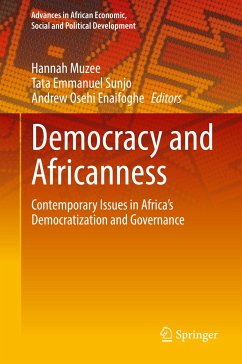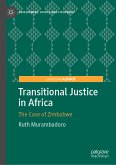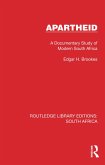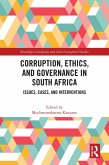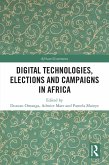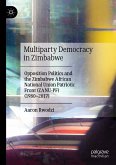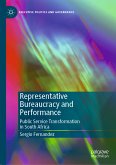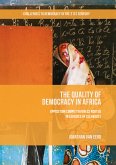Democracy and Africanness (eBook, PDF)
Contemporary Issues in Africa's Democratization and Governance
Redaktion: Muzee, Hannah; Enaifoghe, Andrew Osehi; Sunjo, Tata Emmanuel


Alle Infos zum eBook verschenken

Democracy and Africanness (eBook, PDF)
Contemporary Issues in Africa's Democratization and Governance
Redaktion: Muzee, Hannah; Enaifoghe, Andrew Osehi; Sunjo, Tata Emmanuel
- Format: PDF
- Merkliste
- Auf die Merkliste
- Bewerten Bewerten
- Teilen
- Produkt teilen
- Produkterinnerung
- Produkterinnerung

Hier können Sie sich einloggen

Bitte loggen Sie sich zunächst in Ihr Kundenkonto ein oder registrieren Sie sich bei bücher.de, um das eBook-Abo tolino select nutzen zu können.
This book examines the governance and democratization process in Africa, its history, trends, and prospects. Written by a diverse panel of experts, the book provides an intersectional and interdisciplinary analysis of Africa's democratic environment. Chapters cover topics such as the evolution of democracy in Africa, electoral politics, gender, activism, human rights, and cultural diversity. Critically assessing the fit of democracy for African countries and offering strategies for the Africanization of democracy, this volume will be important for researchers and students interested in African politics, postcolonial theory, democracy, and governance.…mehr
- Geräte: PC
- ohne Kopierschutz
- eBook Hilfe
- Größe: 5.46MB
![Transitional Justice in Africa (eBook, PDF) Transitional Justice in Africa (eBook, PDF)]() Ruth MurambadoroTransitional Justice in Africa (eBook, PDF)40,95 €
Ruth MurambadoroTransitional Justice in Africa (eBook, PDF)40,95 €![Apartheid (eBook, PDF) Apartheid (eBook, PDF)]() Edgar H. BrookesApartheid (eBook, PDF)31,95 €
Edgar H. BrookesApartheid (eBook, PDF)31,95 €![Corruption, Ethics, and Governance in South Africa (eBook, PDF) Corruption, Ethics, and Governance in South Africa (eBook, PDF)]() Corruption, Ethics, and Governance in South Africa (eBook, PDF)41,95 €
Corruption, Ethics, and Governance in South Africa (eBook, PDF)41,95 €![Digital Technologies, Elections and Campaigns in Africa (eBook, PDF) Digital Technologies, Elections and Campaigns in Africa (eBook, PDF)]() Digital Technologies, Elections and Campaigns in Africa (eBook, PDF)41,95 €
Digital Technologies, Elections and Campaigns in Africa (eBook, PDF)41,95 €![Multiparty Democracy in Zimbabwe (eBook, PDF) Multiparty Democracy in Zimbabwe (eBook, PDF)]() Aaron RwodziMultiparty Democracy in Zimbabwe (eBook, PDF)89,95 €
Aaron RwodziMultiparty Democracy in Zimbabwe (eBook, PDF)89,95 €![Representative Bureaucracy and Performance (eBook, PDF) Representative Bureaucracy and Performance (eBook, PDF)]() Sergio FernandezRepresentative Bureaucracy and Performance (eBook, PDF)40,95 €
Sergio FernandezRepresentative Bureaucracy and Performance (eBook, PDF)40,95 €![The Quality of Democracy in Africa (eBook, PDF) The Quality of Democracy in Africa (eBook, PDF)]() Jonathan van EerdThe Quality of Democracy in Africa (eBook, PDF)73,95 €
Jonathan van EerdThe Quality of Democracy in Africa (eBook, PDF)73,95 €-
-
-
Dieser Download kann aus rechtlichen Gründen nur mit Rechnungsadresse in A, B, BG, CY, CZ, D, DK, EW, E, FIN, F, GR, HR, H, IRL, I, LT, L, LR, M, NL, PL, P, R, S, SLO, SK ausgeliefert werden.
- Produktdetails
- Verlag: Springer International Publishing
- Seitenzahl: 233
- Erscheinungstermin: 31. Oktober 2022
- Englisch
- ISBN-13: 9783031112485
- Artikelnr.: 66293883
- Verlag: Springer International Publishing
- Seitenzahl: 233
- Erscheinungstermin: 31. Oktober 2022
- Englisch
- ISBN-13: 9783031112485
- Artikelnr.: 66293883
- Herstellerkennzeichnung Die Herstellerinformationen sind derzeit nicht verfügbar.
